Clarissa Ward on What It's Really Like to Report Live From Ukraine Right Now
CNN's internationally known war correspondent gets to the heart of the story.
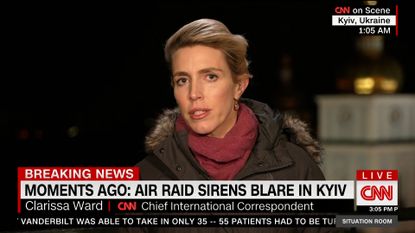

“Oh, there go the air raid sirens,” Clarissa Ward tells me before turning to her crew to make sure they are recording. Loud, shrill wails ring in the background of our call.
The CNN Chief International Correspondent has been in Kharkiv and Kyiv covering the developing story of Russia’s invasion of Ukraine. We’re speaking at 10:30 p.m. her time just before she goes live on The Lead with Jake Tapper. She’s barely slept as she’s been doing this around the clock for more than a month.
Last year you saw Clarissa Ward, clad head to toe—abaya to burqa—interviewing gun-toting Taliban fighters in Kabul as that city fell. She might seem to have ice water running through her veins as she calmly speaks to Taliban members who ignore her completely or order her to cover her face.
Ward has both embedded with Syrian rebels and scored interviews with Syrian President Bashar Al-Assad. She found Western men who had decamped to join ISIS. And on the day Russian President Vladimir Putin’s troops moved into Kyiv, she was there with her crew.
It is all in the service of getting the powerful on-the-ground story of how war affects everyone, from midwives in a medical clinic to boys and girls in a school.
Ward talked to Marie Claire about her reporting in Ukraine, and why it is so important for her to tell the stories of horrific and extraordinary times in the lives of ordinary people around the world.

Ward reports from a subway-turned-shelter in Kharkiv.
Marie Claire: What have you seen since you got to Ukraine?
Stay In The Know
Get exclusive access to fashion and beauty trends, hot-off-the-press celebrity news, and more.
Clarissa Ward: When I was in Kharkiv, we went to a subway station that had become an impromptu bomb shelter. And there were just hundreds of people there, with their families, with their pets, trying to distract their children so that they wouldn't be frightened. And it was pretty heartbreaking because you see how frightened people are, and how full of anxiety, and there's so little information for them. There's no sense of where they can go that's safe. And so I was grateful to have a few hours there just to really be able to talk to lots of people and share their experiences.
MC: It’s been horrible looking at these images in the news and thinking, These are people just like me. I'm sitting here at my computer at my dining table and what if a bomb just lobbed through the front of the house? It's so horrifying to imagine.
CW: Yeah. And, that's especially true when you're in a subway station, right? This is Europe, I'm in a thriving metropolis, and I'm in a subway station—these are all very familiar spaces to us. And yet, to see images that look more like the Second World War Blitz, where people went down to subway stations to take cover during bombardment. It's so jarring and it is surreal because on the one hand, it does look really familiar. But on the other hand, it's of course not. It's an extraordinary situation, that I think almost no one here in Ukraine actually believed was going to happen.

Ward (literally) in the trenches in Ukraine before Russia attacked.
MC: In America, for days we've been hearing "It's going to happen; it's going to happen.” And then the news would interview people in Ukraine asking if they were going to another country, "Are you going to another country? Are you going away from the border?"
CW: No one believed this was going to happen. The attitude of Ukrainians, partly because their government was telling them, they thought the Americans [were saying invasion was imminent] as a tactic that they were using to try to thwart Putin's plan. But no one here believed for a second that Russia was going to invade Ukraine, until they heard and woke up to those bombs, whenever it is now, I can't even [think]...on Wednesday morning or Thursday morning. Thursday morning. It’s so surreal and I've barely slept. So, I think it was only then that they realized.
MC: Do you think the U.S. is going to end up putting troops in? I know they keep saying, "We're not going to do that.” But at a certain point, I feel like there will be pressure for NATO countries to act.
CW: For now, I can't see it happening that the U.S. would get involved militarily, but obviously you can't rule anything out. I think a lot will depend on the coming weeks. I just don't know, is the answer. President Biden's been pretty emphatic about it. I'm just not sure that the Americans have any appetite to get involved in a war in a country that's quite far away.
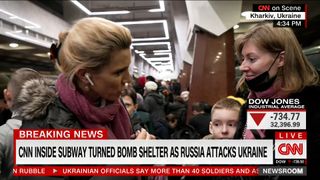
Ward listens to a mother's story of courage under fire as they shelter in a Kharkiv subway station.
MC: What do you tell your two young kids? Are they old enough to understand where you are?
CW: They are so little that they don't know—which is actually kind of a blessing for now. Once I leave the room, to them it's like I don't exist. And I am sure that it will get much harder as they get older and you do have to explain it to them then. I really don't want my children to have to think about war at all… until they're much, much older.
MC: What about your family members who are old enough to know what is really going on?
CW: They're used to it, but it's hard for them, too. I think Afghanistan was very hard for them this summer, because it's always hard for them. My husband, my parents, my close friends, they trust my judgment, and they know that I'm really very, very cautious, and that we have a great team who are super mindful of any risk that we take. So, I think that goes a long way. And then, look, there is a natural thing as well, that you just hide some things from your family. I was doing a FaceTime a couple of hours ago with my kids during bathtime, and there were explosions going off in the background. But they were far enough away and the doors were closed. You couldn't pick it up on the camera mic. So yeah, it's surreal to be doing FaceTime with your kids during their bathtime while there's bombs going off in the distance. And I think, honestly, what it makes me realize—and being in that subway station with all these families—is just how hard it is for parents who are in a situation like this one, with their families, their petrified children.
I interviewed one woman called Oksana who was in the subway shelter with her two kids. I asked her if she was scared and she was like, "Of course we're scared, but we have to try to hide it for our children, because we don't want to frighten [them]." And that just really struck me, and stayed with me because those moments are the reason that I do this work and that I cover conflict because I'm always just so blown away by people's courage, and these small acts of great generosity in hugely stressful situations. When I went to a kindergarten that got hit by a shell, the teacher was telling me, "We pretended to the children that it was a game." Just how much strength do you have to summon in a moment like that, where you're fighting for your life? You're creating this elaborate charade so the children won't be scared. I find that really moving.
It's surreal to be doing FaceTime with your kids during their bathtime while there are bombs going off in the distance.
MC: What do you think of the comparisons to Hitler and World War II?
CW: I think there are certain historical comparisons that are apt in terms of: This is the biggest war that Europe has seen since the Second World War. And when I was in that Metro station in the bunker, it definitely reminded me of images we've seen of people taking cover during the Blitz, but I don't necessarily think that the comparisons between Putin and Hitler are helpful in giving us a deeper knowledge and understanding of what is going on in President Putin's mind, to the extent that we can begin to understand that. Which isn't to say there might not be shared characteristics, but I just think intellectually it's a little bit lazy to just put them in a bunch together, because there are many differences as well, and it's a different context. I'm always cautious about making those kinds of comparisons because I don't think they help people get a better understanding of the situation.

Ward gets a military tour with Ukrainian fighters in Donbas.
MC: Anything else I haven't asked about that you would want people to hear, right now, about what's going on?
CW: The only [other] thing I would want people to know, which I think is so important—a lot of Americans haven't traveled to Ukraine—but [Kyiv is] a European city. This is a vibrant, cosmopolitan city with amazing restaurants and fabulous culture, and lots of international students and multilingual, young, smart, cool people who, really, are trying to build interesting and rich lives for themselves, and want a future closer to the West. And the punishment they're facing for that, for the audacity of having those dreams, and those ambitions, is just astonishing, especially in 2022 in Europe. I just don't think anyone can quite get their head around that fact.
This interview has been edited for length and clarity.
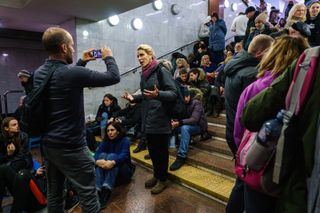
Ward films a segment in the subway station among Ukrainians in hiding in Kharkiv.
Maria Ricapito is a writer who lives in the Hudson Valley.
-
 'Missing You' Includes a Surprise Cameo From One of the U.K.'s Biggest TikTok Stars—Here's What to Know About GK Barry
'Missing You' Includes a Surprise Cameo From One of the U.K.'s Biggest TikTok Stars—Here's What to Know About GK BarryThe influencer, whose real name is Grace Keeling, makes her acting debut on the new Netflix thriller series.
By Quinci LeGardye Published
-
 The Nod to Princess Diana You Might Have Missed in Meghan Markle's Netflix Trailer
The Nod to Princess Diana You Might Have Missed in Meghan Markle's Netflix TrailerThe Duchess of Sussex kept one of Diana's belongings close throughout the series.
By Kristin Contino Published
-
 Jennifer Lawrence Anoints the First It Shoe of 2025
Jennifer Lawrence Anoints the First It Shoe of 2025It's from The Row, of course.
By Halie LeSavage Published
-
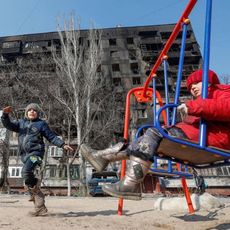 For These Ukrainian Women, Their Weapons Are Their Smartphones
For These Ukrainian Women, Their Weapons Are Their SmartphonesBy collecting cell phone video straight from the front lines, Dattalion shows the unfiltered horrors of the war.
By Maria Ricapito Published
-
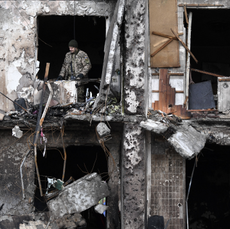 "It Is Hell."
"It Is Hell."Marie Claire Ukraine staffers on what they’re enduring as bombs fall on their beloved country.
By Galia Loupan Published
-
 The Texas Abortion “Snitch” Site Is Having a Bad Weekend
The Texas Abortion “Snitch” Site Is Having a Bad WeekendFirst it gets flooded with sexy Shrek memes, then the web host tells it to get lost.
By Cady Drell Published
-
 A High School Valedictorian Used Her Graduation Speech to Call Out Texas's Abortion Bans
A High School Valedictorian Used Her Graduation Speech to Call Out Texas's Abortion Bans"I am terrified that if my contraceptives fail, I am terrified if I am raped, that my hopes and dreams and aspirations and efforts for my future will no longer matter..."
By Megan DiTrolio Published
-
 Rep. Katie Porter Used Her Whiteboard to Destroy a Big Pharma Exec
Rep. Katie Porter Used Her Whiteboard to Destroy a Big Pharma Exec"Ooh BURN."
By Megan DiTrolio Published
-
 Ma’Khia Bryant Was Shot and Killed by a Columbus Police Officer. Here's What We Know.
Ma’Khia Bryant Was Shot and Killed by a Columbus Police Officer. Here's What We Know.Bryant was just 16 years old.
By Megan DiTrolio Published
-
 Read Kamala Harris's Inauguration Speech
Read Kamala Harris's Inauguration SpeechKamala Harris delivered a powerful and moving speech on the evening of the 2021 inauguration. Read the full transcript of the speech here.
By Megan DiTrolio Published
-
Amanda Gorman Blew Everyone Away With Her Inauguration Poem
"I liked Biden's speech, but this poem is giving me courage, inspiration, and life."
By Megan DiTrolio Published